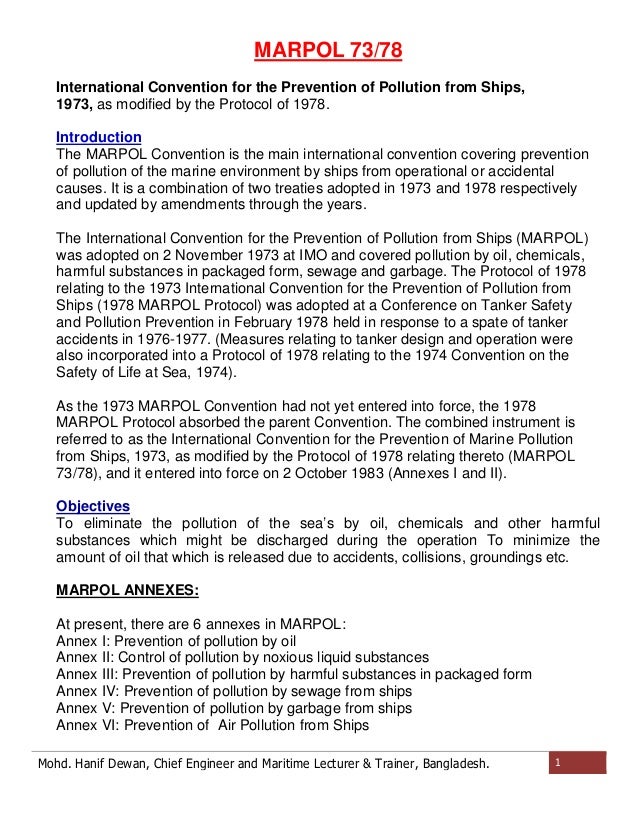GLOBAL MARITIME REGULATORY SYSTEM
MARPOL
MARPOL is the main international convention aimed at the prevention of pollution from ships caused by operational or accidental causes. It was adopted at the International Maritime Organization (IMO) in 1973. The Protocol of 1978 was adopted in response to a number of tanker accidents in 1976–1977.
MARPOL (The International Convention for Prevention of Marine Pollution For Ships): The Ultimate Guide. Just like SOLAS, which regulates the shipping industry to follow minimum standards to safeguard life at sea, MARPOL is another important convention which safeguards the marine environment against ship pollution.
ANNEXES

The 1978 Protocol was absorbed into the parent Convention and the combined instrument entered into force in 1983. In 1997, a Protocol was adopted to amend the Convention and a new Annex VI was added, which came into force in May 2005. The technical requirements of MARPOL are included in six separate Annexes:
- Annex I—Regulations for the Prevention of Pollution by Oil
- Annex II—Regulations for the Control of Pollution by Noxious Liquid Substances in Bulk
- Annex III—Prevention of Pollution by Harmful Substances Carried in Sea in Packaged Form
- Annex IV—Prevention of Pollution by Sewage from Ships
- Annex V—Prevention of Pollution by Garbage from Ships
- Annex VI—Prevention of Air Pollution from Ships
Maritime Safety (MARSAF)
Perform as Associate Port State Control Inspector after proper orientation by Coast Guard PSC officers. Report to the PCG noted vessel deficiencies, particularly those of vessels carrying passengers and those carrying hazardous cargoes.
The best way to promote safety of life and property at sea is the implementation of maritime safety rules and regulations. With the expertise of the PCGA members, it can be essential and more effective to render such expertise in assisting the PCG through the following:
- Perform as Associate Port State Control Inspector after proper orientation by Coast Guard PSC officers.
- Report to the PCG noted vessel deficiencies, particularly those of vessels carrying passengers and those carrying hazardous cargoes.
- Provide competent instructors during trainings conducted by the PCG and when requested, to make available technically competent PCGA members to assist in the conduct of ship inspection and/or marine casualty investigations.
- Assist the PCG in providing courses, seminars and workshops on water safety, such as, boat handling, typhoon doctrines, and safety procedures during search and rescue operations conducted by local governments and non-governmental organizations (NGOs).
- In coordination with the PCG, help provide seminars for fishermen and other coastal communities whose means of livelihood is dependent on fishing and small boat travel in order to explain the effects of tropical cyclones (tropical depression, tropical storm and typhoon) and the importance of adhering to the Coast Guard regulations governing movement of vessels during heavy weather and also in the absence of any Public Storm Warning Signal.

Majority of conventions adopted by IMO usually fall into three main categories - maritime safety, prevention of marine pollution, and liability and compensation, especially in relation to damage caused by pollution.

The regulations of MARPOL Annex VI apply to all ships, except where expressly provided. This means that even though the ship may not need an IAPP Certificate due to its tonnage, the regulations still have to be complied with.
Comments
Post a Comment